Too-Specific Top 10 - Guff Rewrites Removal

(Guff Rewrites History | Art by Matt Stewart)
Not Just Player 1, but Player 2, and Player 3!
Welcome to Too-Specific Top 10, where if there isn’t a category to rank our pet card at the top of, we’ll just make one up! (Did you know that Vronos, Masked Inquisitor is the only planeswalker with an on-battlefield removal ability that affects "each opponent"?)
I haven't thrown down a hot take in a while, and I have to admit that the lack of hype for one of the cards spoiled in Commander Masters last week is getting to me.
When Guff Rewrites History was spoiled, the conversation revolved around two things: Chaos Warp and chaos, and honestly, I don't think that's accurate or fair. For one, Guff Rewrites History isn't Chaos Warp. Every player is more or less guaranteed a spell that will be able to be cast, with the only real exceptions being removal that doesn't have a current target. Heck, even Counterspells are relevant, provided you aren't the first player to put your spell on the stack! Chaos Warp, on the other hand, has a rather high likelihood of flipping into a non-permanent and resulting in nothing at all. As for Guff Rewrites History being relegated to "just another chaos card", I don't buy it. Far from being Warp World, this is an efficient, three-mana spell that can remove most relevant targets, and is likely to have you upgrading a random token or utility creature into something better.
Another comparison that is a bit more apt I've seen is Decimate.
The reason this has come up a lot in conversation is because Decimate and Guff Rewrites History do a lot of the same things. They both get rid of four targets, and they both have to have four legal targets to be played in the first place. There are also a few main differences between the two, however: Guff Rewrites History can be all over the place as far as what results from it after it removes the biggest problems each opponent controls, it includes you in the "destruction", it needs the relevant required targets to be on each different player's board, and most importantly, it's an instant.
For me, that last part is what pushes this over the top into being a good spell. To explain, let's take a look at what other mass targeted removal spells that care about each player/opponent are doing in comparison.
Top 10 "Each Player" Targeted Removal Spells
There are a lot of effects in Magic that have you choose a target for each player, whether that be at the whole table or just the parts of it that aren't you, but not as many as you might think. My rough search I used to come up with this list only finds 50 cards using this mechanic, although it must be mentioned that many of them are newer, designed since the focus of R&D switched over to what feels like solely Commander. This probably means that we can expect more of these cards as we move into the future, a prediction I feel all the more confident in making with the Commander Masters precons sporting multiples of this effect.
It's not all old, however. Infamously, Sylvan Primordial is on the ban list for having exactly this effect, although it's getting to the point where that feels a bit more ridiculous by the day as more and more seven-mana "you just win the game, basically" creatures are made. Looking at the oldest versions of this effect printed, however, I did notice something that I felt needed eliminating in our criteria:
Many of the older cards sporting this "each opponent" effect for some reason care about theft. That's all well and good, and I'm not saying that staples that have stood the test of time, like Blatant Thievery and [/el]Mass Mutiny[/el], shouldn't be seeing play. What I am saying is that Control Magic and Act of Treason effects are expensive, whereas Guff Rewrites History is attempting to fill the role of one- to two-mana removal effects that have a disadvantage. With that in mind, I threw the Molten Primordial out with the bathwater, but otherwise tried to take the best of the best into account! Let's take a look.
Criteria: Cards that can remove some sort of permanent from their battlefield for each player or each opponent. As is tradition, all results are ordered by EDHREC score.
10. Decoy Gambit
(3,525 Inclusions, 0% of 1,357,883 Decks)
I'm kind of surprised that I'd never seen Decoy Gambit before. Don't get me wrong, it's kind of a worst-of-the-worst kind of Browbeat effect, where it's more or less always going to feel bad when you could be removing the biggest problem creature at the table. The good news? If that happens, then you're drawing three cards for three mana! I like this card, despite it having the classic "your opponent makes the choice, not you" problem. However, I don't think it fits into just any deck looking to draw cards. Where I do think it fits is in control decks, where this will often be an end-of-turn choice for your opponents between you temporarily removing their best creature or letting you draw into more gas (that's probably removal anyhow).
9. The Horus Heresy
(3,602 Inclusions, 2% of 198,942 Decks)
This one almost got thrown in the bin with Blatant Thievery, but it actually uses the "for each player/opponent" mechanic twice in the same Saga! The Horus Heresy is the epitome of a six-mana spell that's going to be worth the cost: stealing three creatures, then drawing you cards for those you manage to keep around, then probably destroying most of them rather than giving them back in a discussion that's sure to mess with some politics at the table. While I don't expect it to ever see crazy numbers given its three-color nature, there's no doubt that if you're in Grixis you're considering this alongside stuff like Cruel Ultimatum.
8. Luminate Primordial
(4,230 Inclusions, 0% of 1,245,654 Decks)
Seven mana for three Swords to Plowshares doesn't really add up if you ask me, but just ask Craterhoof Behemoth how much being stapled onto a creature is worth. There's no doubt that Luminate Primordial could have been knocked down to six mana, but even at seven mana Blink and Reanimator decks are happy to put down a defensive creature and exile all the biggest threats at the table.
7. Enigma Thief
(7,124 Inclusions, 1% of 1,357,883 Decks)
Sphinx decks have never been that popular, but that's not to say that they're nonexistent. What's really popular are Rogue decks, which are getting ready to crack 10,000 total decks any day now. In either case, you're more or less required to throw this card in the mix, as four mana to bounce the best stuff is too cheap of an effect to not include (even before taking into account that it's stapled to a 5/5 flier). Throw in some Changeling love, and there's more than enough pieces to make just about anyone a fan.
6. Vaevictis Asmadi, the Dire
(Helms 1,956 Decks, Rank #421; 6,507 Inclusions, 2% of 288,127 Decks)
Six mana to repeatedly Chaos Warp in a color combination never short on tokens is about as close of a comparison as we're going to get to Guff Rewrites History, and I like it. Don't get me wrong, Guff Rewrites History as a three-mana instant that guarantees a spell as opposed to flipping lands or a spell that won't get cast makes it a lot different than Vaevictis Asmadi, the Dire. With that being said, anyone who's spent some time with Vaevictis has had things go badly at some point; with a flip creating an even bigger problem entering the battlefield to replace the one you just "solved".
What I would ask is, do those Vaevictis players just stop playing Vaevictis because they had one game go bad? No, they play the percentages, and that's the universe where I see Guff Rewrites History being good. Will you lose a game or two where you cast this spell to get rid of a random player's commander and they flip into a tutor or combo piece? Yes, absolutely. But 90% of the time you're going to target four things and have four random, way less impactful spells flip (which you'll be fine with, given that you're most likely targeting a token or a utility creature).
5. Dismantling Wave
(14,575 Inclusions, 1% of 1,250,640 Decks)
Flexible and devastating, the only hope I could ever have to make Dismantling Wave more impactful would be to have it at instant speed, and even that you can do with the board wipe option if you're sitting on eight mana. Let's be real, however, most times you're not hard-Cycling this, the second ability really only gets used in Cycling decks, and they don't want to do it because most of their engines are either artifacts or enchantments.
In other words, 99% of the usage of this card is in its three-mana mode, where even at sorcery speed, it feels pretty great to be getting a three-for-one.
4. Sheoldred
(Helms 607 Decks, Rank #906; 16,231 Inclusions, 5% of 317,534 Decks)
Some of you may be wondering why edicts didn't make our criteria for the week, and the answer is that they didn't have the "for" in "for each opponent/player". Sheoldred, however, unlike her edict, does... on her back side. Though an edict for five mana feels pretty underwhelming, even attached to a 4/5 with menace, for another five mana you can flip her into a Saga that will have you destroying creatures of your choice, rather than your opponents'. Even better, it will then discard and mill them as well before having you return all creatures from all graveyards to your side of the battlefield.
Which all sounds great, except that's ten mana and three to four turns. Who has either of those kind of resources or time?
3. The Eternal Wanderer
(21,503 Inclusions, 4% of 532,033 Decks)
Normally I would state my usual "we shouldn't be gauging planeswalkers on their ultimates? but The Eternal Wanderer is a bit of an exception because she can ultimate under her own power the turn she comes into play. This does a reasonable impression of Tragic Arrogance for creatures only, and leaves The Eternal Wanderer with a single loyalty counter to try and survive the turn with her inherent Silent Arbiter ability.
Outside of her ultimate, however, The Eternal Wanderer is still no slouch. Blink decks love having a planeswalker that can facilitate ETBs every turn, and 2/2 Samurai with double strike will add up quickly, as well. In short, six mana for a planeswalker is a lot, but given how impactful she can be and how well she protects herself, you could do worse things with your mana.
2. Amphin Mutineer
(27,954 Inclusions, 2% of 1,363,267 Decks)
Encore abilities should be all over this list, but most of the Encore creatures don't target. Technically, it's two different abilities that qualify Amphin Mutineer for our criteria this week, but I decided to let it go because it was exactly the kind of mass targeted removal we were looking for. 4/3s can still be large enough to have a serious impact on the game, but having the ability to get rid of four problems as the game wears on is too good to pass up. In short, Amphin Mutineer is a control player's dream: A creature that solves a problem for you, then blocks for you, then comes back in the late game as a windmill slam that seals your victory.
1. Grasp of Fate
(28,699 Inclusions, 2% of 1,250,640 Decks)
For sheer efficiency, you can't beat Grasp of Fate. Yeah, every once in a while it will come down and immediately get removed by the player who was winning in the first place, making it feel like you did nothing at all. That rarity doesn't even get close to getting rid of the shine on this Centaur riding through a field of hands, however. Most of the time, it'll come down and solve every immediate, game-winning problem out there, and then stick around for turns afterward until something entirely different wins (hopefully you).
Honorable Mentions
We've beaten around the bush a bit, but I want to be clear, if there's any confusion: I like Guff Rewrites History. I like it so much, actually, that I've been testing it out for cEDH. Not having a regular pod that I get to play with all the time, however, and not having the card physically in my possession as of yet, I had to devise a means of said testing that got a bit unorthodox. Essentially I played games against myself in various windows on the various deckbuilding services out there, with the following rule governing it all:
- Each deck in a four-player pod will take turns starting a game with Guff Rewrites History in their command zone, resulting in four games that will end upon resolving Guff Rewrites History.
Two of these cEDH decks are from the more widely accepted meta, in the guise of Winota, Joiner of Forces straight from the cEDH Deck Database, and a Tevesh Szat, Doom of Fools/Kraum, Ludevic's Opus brew that took top four at Mox Masters in January of this year. The other two are my own cEDH brews that I personally play, a Magar of the Magic Strings classic Smokestack build that plays too low to the ground to actually include Smokestack, and Five-Color-Ten-Card, an experiment in if you can win games of cEDH by just having access to all five colors and ten cards in "hand" with two Partners and a Companion (spoiler alert: you can, but probably not as many as you could be by being a bit less cute).
cEDH Pod, Game 1 (Guff Rewrites Winota)
- Turn Guff Rewrites History was cast: 6
- Targets: Skrelv, Defector Mite (Self), Faeburrow Elder, Goblin Vandal, & Tevesh Szat, Doom of Fools
- Flips: Shatterskull Smashing for zero (Self), Misdirection with only target as Shatterskull, Anger, & Demonic Tutor
Definitely a rough pull here with us getting nothing, and the Tevesh Szat (the most pressing target) only getting a Demonic Tutor. Not much else to say, honestly, this will happen with this card.
cEDH Pod, Game 2 (Guff Rewrites Magar)
- Turn Guff Rewrites History was cast: 3
- Targets: Liquimetal Torque (Self), Cursed Mirror (copy of Winota, Joiner of Forces, Winota, Joiner of Forces), Phantasmal Image (Copy of Thalia's Lancers)
- Flips: Dockside Extortionist (Self), Grand Arbiter Augustin IV, Kiki-Jiki, Mirror Breaker (no notable combo on board), and Cyclonic Rift (You can't Overload it on a free cast).
This is a much more promising resolution, with us getting a Dockside Extortionist from our mana rock to further fuel stuff, and our opponents essentially getting nothing of worth except a single bounce. This shows the kind of promise that this card could present.
cEDH Pod, Game 3 (Guff Rewrites Mike & Eleven)
- Turn Guff Rewrites History was cast: 6
- Targets: Trophy Mage (Self), Opposition Agent, Lightning Greaves, Archon of Emeria
- Flips: Elesh Norn, Mother of Machines (Self), Cyclonic Rift (had just been tutored to the top), Savage Beating, Legion Warboss
A lot of the promise from the last game hangs over for this one, but I must say that the main problem with Guff Rewrites History reared its ugly head in a very meaningful way during this playthrough. The Magar deck spent most of the game wallowing in mana screw, presenting no legal targets. This was not an issue only present in this game, either: The likelihood in a high-powered pod that you will have a player with essentially no board presence except for lands is high, and holding up three mana in case they try to win does not feel good.
cEDH Pod, Game 4 (Guff Rewrites Kraum & Tevesh)
- Turn Guff Rewrites History was cast: 4
- Targets: Notion Thief (Self), Goblin Engineer, Winota, Joiner of Forces, Grand Arbiter Augustin IV
- Flips: Demonic Tutor (Self), Imperial Seal, Ornithopter, Faeburrow Elder
This was a desperation cast to get rid of both the Winota and the Grand Arbiter, and it worked out really well for us in the flipping of a Demonic Tutor while giving our opponents a slower tutor, a 0/2, and an admittedly incidentally-infinite-if-you-look-at-it-wrong mana dork. Still, there's a reason that Turbo-Naus decks don't play much removal, and that goes double for removal that requires you to have a board presence to target. When the problem started presenting itself in the form of Winota and Grand Arbiter, I had to play down a Notion Thief just to have a legal target on my own board, at which point I then had to wait to untap before I could actually play Guff Rewrites History. Definitely not a card that belonged in this specific deck.
All in all, this exercise was a bit of fun, but the problem of not having legal targets, e.g. Decimate, was a much bigger deal than I thought at the highest power level. I still stand by Guff Rewrites History being a great card for more general Commander, but I am walking back my opinion on it in cEDH rather aggressively after seeing how even with slower Stax decks dominating a pod it often couldn't find a board where it could legally be used.
Still, feel free to try it out yourself and see!
Nuts and Bolts
There always seems to be a bit of interest in how these lists are made (this seems like a good time to stress once again that they are based on EDHREC score, NOT my personal opinion…), and people are often surprised that I’m not using any special data or .json from EDHREC, but rather just muddling my way through with some Scryfall knowledge! For your enjoyment/research, here is this week’s Scryfall search.
What Do You Think?
And finally, what is your favorite use of "for each player/opponent" effects so far? Is it Guff Rewrites History? Do you think I'm wrong that it's good, or wrong that it's not good enough for cEDH?
Let us know in the comments, and we'll see you at the table we had to carry our board states over to with our playmats mid-game. Don't fret, we've all been there.
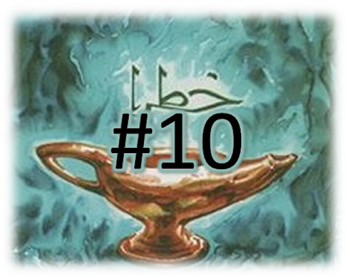


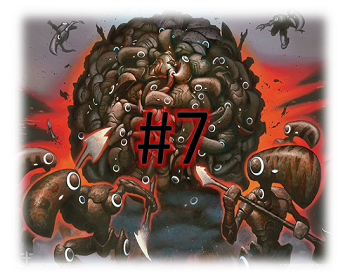


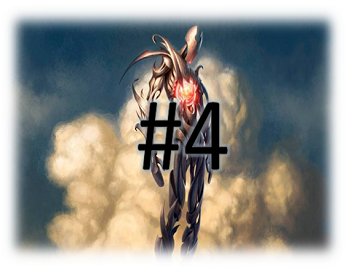
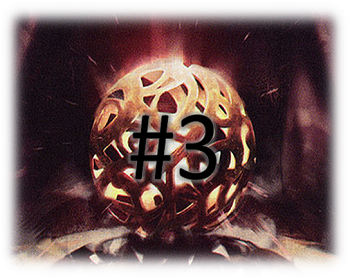
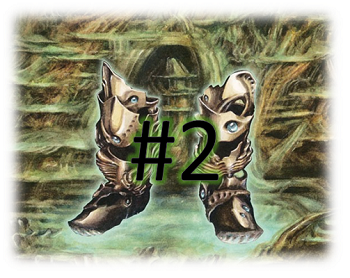

EDHREC Code of Conduct